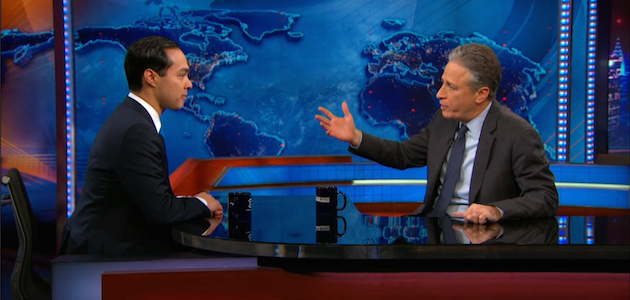U.S. Department of Housing & Urban Development Secretary Julián Castro continued his media tour Monday night, joining The Daily Show with Jon Stewart for a wide-ranging discussion touching on the recent announcement that the Federal Housing Administration will cut its annual mortgage insurance premiums, whether the government has learned anything from housing crisis and whether the FHA will need another bailout any time soon.
Castro began the interview by touting the FHA mortgage insurance premium cut, which will see the FHA reduce its annual mortgage insurance premiums by 50 basis points, from 1.35% to .85%.
“(The announcement) sounds boring, but it’s actually going to mean that new borrowers under FHA would get a savings of about $900 a year,” Castro said.
“Now, people get nervous when you start talking about mortgages and refinancing,” Stewart said. “We remember in 2008 something about mortgages and refinancing…that collapsed the global economy. And the FHA got a billion and a half dollar bailout. So what’s different now?”
Castro defended the FHA, telling Stewart that the FHA did not engage in “riskier” mortgages. “People remember those ‘no-doc’ loans,” Castro said. “What we’re trying to do is keep strong safeguards in place. We set a credit floor. If you have a credit score underneath 580, you need put down 10%, instead of the usual 3.5%.”
Asked by Stewart about FHA’s reserve capital, Castro said that the FHA currently has $40 billion in reserve. “The FHA has gotten much stronger,” Castro said. “That’s one of the things that allows us to do this now and keep safeguards in place and meet the mission of insuring that the middle-class has a chance to move forward.”
Stewart then asked Castro what the FHA’s capital reserve ratio is. “Statutorily, it’s a 2% ratio,” Castro said. “So you guys are beyond that with your $40 billion?” Stewart asked.
“No, no,” Castro said. “We’re at .41% but we’re on a very strong trajectory to get to 2% within the next couple of years.”
Castro then added that when the FHA needed a “mandatory draw” of $1.7 billion, the FHA’s capital reserve ratio was actually at -1.11%.
Stewart also asked Castro if there is still the chance for another crash. “Once you give people mortgages, you are not selling them, bundling them, making derivatives, handing them over to other banks?” Stewart said. “We’re not doing any of that stuff any more?”
Castro equivocated for a moment, preparing to touch on the secondary mortgage market. “Just say no,” Stewart interjected. “Just say no.”
As Stewart put his head in his hands, Castro smiled and said, “Not in the same way. The landscape of lending and secondary mortgage products has changed significantly since then. And you know, for the better, obviously.”





